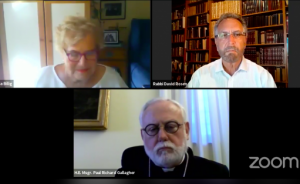NEWS Vatican diplomacy’s commitments and weaknesses: from Israel to relations with Judaism
“We’re living in a moment of great conflict, including in the Middle East. All of this is creating an atmosphere in which many discriminations will probably continue to thrive. We need a lot of work at the grass-roots level to change hearts,” said Paul Gallagher, Vatican’s Secretary of Relations between States – the Holy See’s “Foreign Minister”. The English Archbishop was hosted in a behind-the-scenes meeting on Vatican diplomacy which was organised by the American Jewish Committee (AJC) with the participation of Rabbi David Rosen, AJC’s International Director of Interreligious Affairs, and moderated by journalist Lisa Billig, AJC Representative in Italy and Liaison to the Holy See. The meeting was an occasion to address different topics, among which were engagement in dialogue, the fight against antisemitism, and ongoing negotiations between the Vatican and Israel.
The archbishop recalled the turning point represented by the Second Vatican Council and especially by the declaration Nostra Aetate, which marked the starting point for new discussions characterised by action against long-established forms of prejudice in Christian society. He underlined that significant goals have been accomplished, but there is a long way to go.
“We need to work on educating also young people aspiring to an ecclesiastical career, who don’t always have the opportunity to come into direct contact with Judaism. I myself grew up in a city with a strong Jewish presence, but I truly got to know this reality only much later,” Gallagher said. Hence, the need for the “eradication of and fight against ignorance”.
However, urged by his interlocutors, Gallagher seemed weak in some of his answers, particularly those regarding cooperation with the Jewish State, which so far has supposedly not reached a satisfactory level, and on the choice not to adopt the working definition of antisemitism as formulated by the International Holocaust Remembrance Alliance (IHRA). According to the Vatican representative, definitions like IHRA’s are “overly restricted to a certain background, whereas the whole situation of antisemitism is fluid.”
Rosen has expressed his disappointment for the fact that no Jewish representatives were involved in the writing and promotion of the Document on Human Fraternity for World Peace and Living Together signed in Abu Dhabi last year. According to the rabbi, it was “a missed opportunity” as well as a facilitation to a controversial figure, to say the least, such as imam al-Tayeb, who did not stand out for friendship with Jews and Israel over the last few years.
Translated by Claudia Azzalini and revised by Sara Facelli, both students at the Advanced School for Interpreting and Translation of Trieste University and interns at the newspaper office of the Union of the Italian Jewish Communities.

